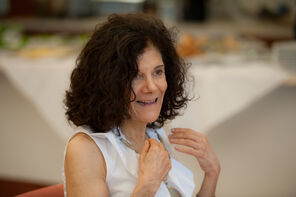Graciela Teresa de Pierris, historian of modern philosophy, dies at 74
Her scholarship led to insights on Hume, Locke, Descartes, and others.
Graciela Teresa de Pierris, the Clarence Irving Lewis Professor in Philosophy in the School of Humanities and Sciences and a widely known scholar of modern philosophy, died Aug. 20. She was 74.
De Pierris’s scholarship led to insights on a range of philosophers, including John Locke, René Descartes, and Immanuel Kant. But her primary area of interest was the work of the 18th-century Scottish philosopher David Hume.
Hume was the focus of her book, Ideas, Evidence, and Method: Hume’s Skepticism and Naturalism Concerning Knowledge and Causation (Oxford, 2015). In it, she reconciled Hume’s religious and political skepticism with his faith in the rational world of science, including then-new understandings of physics and medicine. A review of the book summarized her insights this way: “Radical skepticism, far from being harmful, actually enables the human mind to resist the temptations of metaphysics and the dangers of religion.”
On campus, she was eager to share her passion for philosophy. She cared deeply for her students and pushed them to achieve a high level of understanding of epistemology and philosophy.
“Graciela would always stop to talk with me on campus, and she always wanted to talk philosophy—something exciting she had found in her beloved Hume or an intriguing idea someone raised in a colloquium,” said Krista Lawlor, the Henry Waldgrave Stuart Memorial Professor of Philosophy in H&S. “Her joy in these little conversations was so immediate and so evident.
“I admired how fearless she was in her work,” Lawlor added. “In her 2015 book, she set out to resolve a difficult paradox in David Hume’s work—he seems to be a skeptic, but he also advances positive psychological theories about human nature. How could he do both? Graciela strode right into the fray with her characteristic verve and deep knowledge. I found that inspiring.”
A fresh and courageous writer
De Pierris arrived at Stanford in 2002 as an associate professor and was appointed to her endowed professorship in 2021.
“Graciela’s historical work details the debts of a great philosopher, David Hume, to a great natural scientist, Isaac Newton,” said David Hills, associate professor (teaching) of philosophy in H&S. “Her work as an epistemologist analyzes open-ended exchanges between constructive reasonings designed to shore up common sense and skeptical reasonings designed to undermine it, exchanges neither side can afford to win. Graciela was a gracious and fastidious colleague and mentor; her writing was fresh, resourceful, and courageous. We remember her with great gratitude and great fondness.”
Before her death, she was at work on a project related to Hume, Kant, and the metaphysical tradition.
“Graciela’s colleagues will especially miss her devotion to the life of the mind,” said R. Lanier Anderson, Stanford’s interim vice provost for undergraduate education, the J.E. Wallace Sterling Professor in Humanities, and professor of philosophy in H&S. “She was always attuned to the philosophical side of a conversation and remained ever ready to take an exchange further, whether with students, colleagues, or friends.”
A passion for cherry blossoms
Born in Argentina, de Pierris earned degrees from the Universidad Nacional de La Plata in her home country before earning a doctorate in philosophy from the University of California, Berkeley in 1983. She held assistant and associate professorships at Indiana University and the University of Illinois before coming to Stanford.
Off campus, she had passions for art, opera, and travel—in particular, visiting the cherry blossoms in Kyoto whenever possible. She is survived by her husband, Michael Friedman, the Suppes Professor of Philosophy of Science, Emeritus in H&S; her sister, Marta; and her brother, Carlos.




